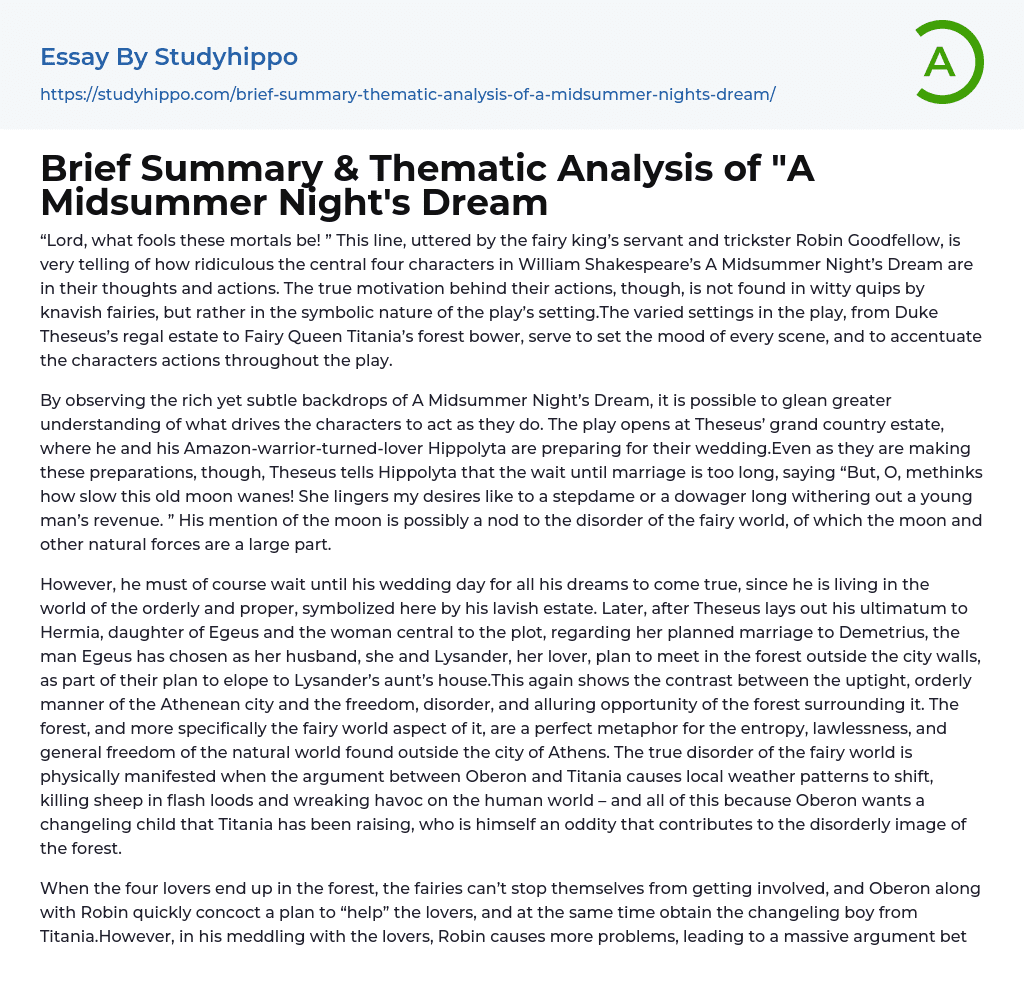

Brief Summary & Thematic Analysis of “A Midsummer Night’s Dream Essay Example
Within William Shakespeare’s A Midsummer Night’s Dream, Robin Goodfellow states, “Lord, what fools these mortals be!”, revealing how absurd the actions and thoughts of the central four characters truly are. However, the play’s symbolic setting holds the true reason for their behavior. The different settings, such as Duke Theseus’s estate and Fairy Queen Titania’s forest bower, establish the tone of each scene and emphasize the characters’ actions throughout the play.
By analyzing the intricate settings of A Midsummer Night’s Dream, one can obtain a deeper comprehension of the motivations behind the characters' actions. At the beginning of the play, Theseus’ lavish estate serves as the backdrop for his upcoming wedding with Hippolyta, who used to be an Amazon warrior. However, despite the preparations being made for the event, Theseus e
...xpresses to Hippolyta his impatience with waiting, stating “But, O, methinks how slow this old moon wanes! She lingers my desires like to a stepdame or a dowager long withering out a young man’s revenue.” It is possible that this mention of the moon is an allusion to the chaos that takes place in the fairy world, where the moon and other natural forces play a significant role.
The lavish estate symbolizes the orderly and proper world that the protagonist lives in, where he must wait for his dreams to come true on his wedding day. However, after Theseus issues an ultimatum to Hermia regarding her marriage to Demetrius, she plans to elope with her lover Lysander in the forest outside the city walls. This highlights the contrast between the Athenian city's uptight orderliness and the alluring freedom of the forest. The forest, particularly its fairy worl
aspect, serves as a metaphor for the natural world's entropy, lawlessness, and general freedom beyond Athens. Oberon and Titania's argument causes weather patterns to shift, leading to flash floods that kill sheep and wreak havoc on the human world, revealing the true disorder of the fairy world. This is due to Oberon's desire for Titania's changeling child, who contributes to the forest's disorderly image.
When the group of four lovers ventures into the forest, the fairies, unable to resist interference, devise a plan with Oberon to assist the lovers while also taking possession of the changeling boy from Titania. However, Robin's meddling causes further problems and incites a heated argument among the lovers. They hurl insults such as "You juggler, you cakerblossom," displaying how their behavior has been adversely affected by the disorderly setting and mischievous fairies. This contrasts with their previously composed demeanor at Theseus's estate. The "love-in-idleness" flower serves as a metaphor for characters' perception and thoughts, as its juice induces uncontrollable attraction to the next being in sight, influencing Titania's sudden infatuation with the donkey-headed Bottom and contributing to the chaos rampant in the forest.
The forest in A Midsummer Night's Dream is portrayed as a place of disorder, which is the opposite of the formal society in Athens. The flower in the forest symbolizes this contrast. Despite their mischievous ways, Oberon and Robin work to restore order by using an antidote for the love potion. The lovers return to Theseus' estate for a triple-marriage ceremony, and order is restored. However, there are two events that show disorder still exists - Theseus defying the Athenian law and Robin's final soliloquy suggesting the play
was just an irrational dream fueled by disorder. Order is seen as characters return inside the city walls where they cannot justify or substantiate their supposed dream, showing how normal reasoning has been restored.
Focusing on the idea presented, Shakespeare demonstrates that extreme opposites - complete order symbolized by Theseus' domain and the grand city of Athens, and utter chaos embodied by the wooded wilderness and the magical realm of fairies - have inherent issues. In illustrating Egeus' demand that Theseus enforce the unyielding law of ancient Athens without consideration for his daughter's true emotions, Shakespeare highlights the absurdity of strictly adhering to traditional customs and regulations. In contrast, when unbridled anarchy erupts in the fairy world during the quarrel between Oberon and Titania, it leads to other issues such as unpredictable local weather patterns.
Attaining genuine happiness requires achieving a harmony between chaos and structure.
- A Doll's House essays
- A Midsummer Night's Dream essays
- A raisin in the sun essays
- A Streetcar Named Desire essays
- An Inspector Calls essays
- Death of a salesman essays
- Everyman essays
- Fences essays
- Hamlet essays
- Hedda Gabler essays
- Iago essays
- King Lear essays
- Macbeth essays
- Much ado about nothing essays
- Oedipus Rex essays
- Oedipus The King essays
- Othello essays
- Pygmalion essays
- Romeo And Juliet essays
- Tartuffe essays
- The glass menagerie essays
- The Importance of Being Earnest essays
- The Merchant Of Venice essays
- The Taming of The Shrew essays
- Twelfth Night essays
- Waiting For Godot essays



